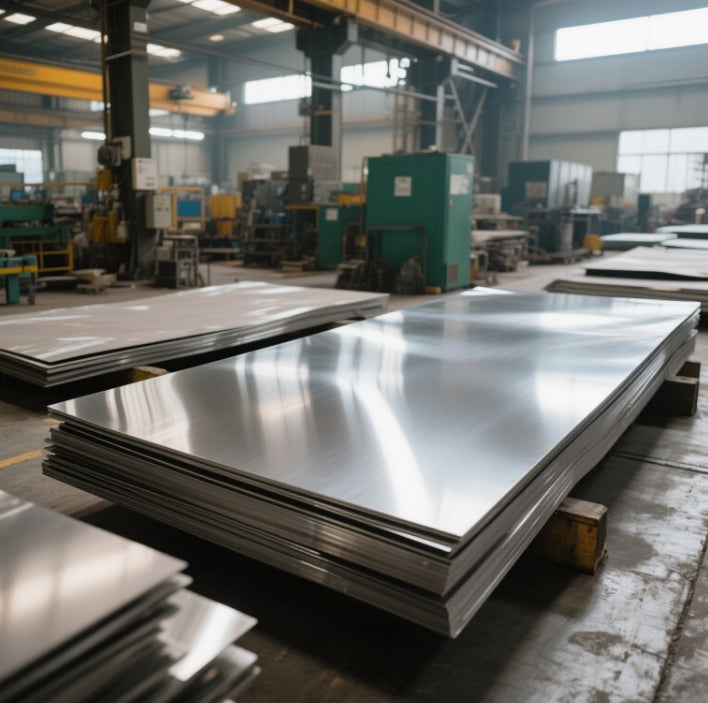StockSteel
Multi-Purpose stainless steel plate | From Art Installations to Industrial Gear
Multi-Purpose stainless steel plate | From Art Installations to Industrial Gear
Couldn't load pickup availability
Multi-Purpose Stainless Steel Plate | From Art Installations to Industrial Gear
Product Specifications
| Attribute | Details |
|---|---|
| Material Grade | 304, 316L, 430 (ASTM A240/A480, EN 1.4301/1.4404) |
| Thickness | 0.5mm – 50mm (Customizable) |
| Width | 1000mm – 2500mm |
| Length | 2000mm – 6000mm |
| Surface Finish | Mirror Polish, Brushed (No.4), Satin, Anti-Slip Checkered, Etched Patterns |
| Hardness | HRB 85-100 (Annealed), HRC 25-40 (Cold Rolled) |
| Density | 7.93 g/cm³ (Grade 304) |
| Processing | Hot Rolling, Cold Rolling, Laser Cutting, CNC Machining, Welding |
Key Features & Benefits
-
Unmatched Versatility
From stainless steel name plate engraving to heavy-duty industrial gear, our plates adapt to diverse applications. Grades like 316L (2-3% Mo) resist saltwater corrosion, while 430 offers cost efficiency for indoor projects. -
Superior Mechanical Properties
- Tensile Strength: 515–1035 MPa (304 Annealed to Cold-Worked).
- Bend Strength: 180° bends without cracking (ASTM E290).
-
Aesthetic Flexibility
Custom finishes like mirror polish or etched designs elevate art installations, signage, and architectural cladding. -
Global Accessibility
Competitive stainless steel plate cost and local availability (stainless steel plate near me) ensure rapid delivery across industries.
Technical Details
1. Tensile Strength
Tensile strength defines the maximum stress a material can endure before breaking. Our plates are tested per ASTM E8 standards:
- 304 Stainless Steel: 515–1035 MPa (ideal for structural and decorative uses like stainless steel name plate production).
- 316L Stainless Steel: 580–860 MPa (enhanced chloride resistance for coastal applications).
- 430 Stainless Steel: 450–600 MPa (cost-effective for indoor fixtures).
2. Bend Strength
Bend strength ensures flexibility under deformation. Tested via three-point bending (ASTM E290):
- Cold-Rolled Plates: Achieve 180° bends for forming machinery parts or art installations.
- Heat-Treated Plates: Retain ductility after hardening, suitable for load-bearing structures.
3. Identification & Marking
- Laser Etching: Permanent grade markings (e.g., "304," "316L") for traceability.
- Heat Numbers: Unique batch codes linked to mill test certificates (MTCs).
- Surface Codes: "2B" for cold-rolled, "BA" for bright annealed finishes.
4. Weight Calculation
Formula:
Weight (kg) = Thickness (mm) × Width (m) × Length (m) × Density (7.93)
Example: A 10mm × 1.2m × 3m plate weighs 285.48 kg.
5. Why Does Stainless Steel Rust?
Despite its corrosion resistance, rust can occur due to:
- Chloride Exposure: Saltwater or de-icing agents degrade the chromium oxide layer.
- Mechanical Damage: Scratches or welding defects expose the base metal to oxidation.
- Low-Quality Alloys: Substandard chromium/nickel content in cheaper grades.
- Galvanic Corrosion: Contact with carbon steel or dissimilar metals.
Applications
| Industry | Use Cases |
|---|---|
| Art & Architecture | Sculptures, stainless steel name plate, decorative panels |
| Industrial | Machinery parts, conveyor belts, stainless steel plate near me solutions |
| Consumer Goods | Kitchenware, stainless steel plate cost-effective fixtures, jewelry |
| Construction | Structural beams, cladding, roofing |
Why Choose Our Stainless Steel Plates?
- Certified Quality: Compliant with ASTM, EN, ISO, and JIS standards.
- Sustainable Practices: 70% recycled content, zero VOC emissions.
- Custom Solutions: Tailored dimensions, finishes, and rapid prototyping.
- Cost Efficiency: Competitive stainless steel plate cost with bulk discounts.
- Local & Global Reach: Fast delivery for stainless steel plate near me orders and international projects.

